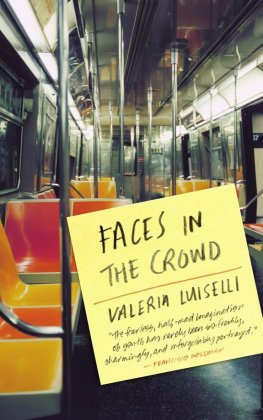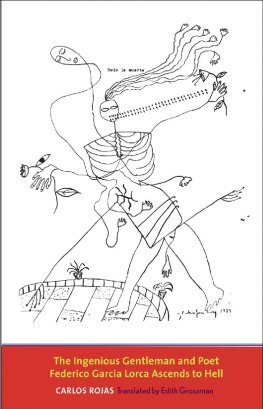Valeria Luiselli
Faces in the Crowd
Beware! If you play at ghosts, you become one.
Anon., The Kabbalah
The boy wakes me up:
Do you know where mosquitos come from, Mama?
Where?
From the shower. During the day theyre inside the shower and at night they bite us.
*
It all began in another city and another life. Thats why I cant write this story the way I would like to as if I were still there, still just only that other person. I find it difficult to talk about streets and faces as if I saw them every day. I cant find the correct tenses. I was young, had strong, slim legs.
(I would have liked to start the way Hemingways A Moveable Feast ends.)
*
In that city I lived alone in an almost empty apartment. I slept very little. I ate badly, without much variety. I had a simple life, a routine. I worked as a reader and translator in a small publishing house dedicated to rescuing foreign gems. Nobody bought them, though, because in such an insular culture translation is treated with suspicion. But I liked my work and I believe that for a time I did it well. On Thursdays and Fridays, I did research in libraries, but the first part of the week was reserved for the office. It was a pleasant, comfortable place and, whats more, I was allowed to smoke. Every Monday, I arrived early, full of enthusiasm, carrying a paper cup brimming with coffee. I would say good morning to Minni, the secretary, and then to the chief editor, who was the only editor and therefore the chief. His name was White. I would sit down at my desk, roll a cigarette of Virginia tobacco, and work late into the night.
*
In this house live two adults, a baby girl, and a little boy. We call him the boy now because, although hes older than his sister, he insists that hes not properly big yet. And hes right. Hes older, but hes still small; hes neither the big boy nor the little boy. So hes just the boy.
A few days ago my husband stepped on a dinosaur when he was coming downstairs and there was a cataclysm. Tears, screaming: the dinosaur was shattered beyond repair. Now my T. rex really has been extincted, sobbed the boy. Sometimes we feel like two paranoid Gullivers, permanently walking on tiptoe so as not to wake anyone up, not to step on anything important and fragile.
*
In winter there were windstorms. But I used to wear miniskirts because I was young. I wrote letters to my acquaintances telling them about my rambles, describing my legs swathed in gray tights, my body wrapped in a red coat with deep pockets. I wrote letters about the cold wind that caressed those legs, compared the freezing air to the bristle of a badly shaved chin, as if the air and a pair of gray legs walking along streets were literary material. When a person has lived alone for a long time, the only way to confirm that they still exist is to express activities and things in an easily shared syntax: this face, these bones that walk, this mouth, this hand that writes.
Now I write at night, when the two children are asleep and its acceptable to smoke, drink, and let drafts in. Before, I used to write all the time, at any hour, because my body belonged to me. My legs were long, strong, and slim. It was right to offer them: to whomever, to writing.
*
In that apartment there were only five pieces of furniture: bed, kitchen table, bookcase, desk, and chair. In fact, the desk, the chair, and the bookcase came later. When I moved in, I found only a bed and a folding aluminum table. There was also a bathtub. But I dont know if that counts as furniture. Little by little, the space began to fill up, though always with temporary objects. The books from the libraries spent the weekends piled high by the bed and disappeared the following Monday, when I took them to the office to write reports on them.
*
A silent novel, so as not to wake the children.
*
Sometimes I bought wine, although the bottle didnt last a single sitting. The bread, lettuce, cheese, whisky, and coffee, in that order, lasted a bit longer. And a little longer than all those five together, the oil and soy sauce. But the pens and lighters, for example, came and went like headstrong teenagers determined to demonstrate their complete autonomy. I knew it wasnt a good idea to place the least trust in household objects; as soon as we become accustomed to the silent presence of a thing, it gets broken or disappears. My ties to the people around me were also marked by those two modes of impermanence: breaking up or disappearing.
All that has survived from that period are the echoes of certain conversations, a handful of recurrent ideas, poems I liked and read over and over until I knew them by heart. Everything else is a later elaboration. Its not possible for my memories of that life to have more substance. They are scaffolding, structures, empty houses.
*
In this big house I dont have a place to write. On my worktable, there are diapers, toy cars, Transformers, bibs, rattles, things I still cant figure out. Tiny objects take up all the space. I cross the living room and sit on the sofa with my computer on my lap. The boy comes in:
What are you doing, Mama?
Writing.
Writing just a book, Mama?
Just writing.
*
Novels need a sustained breath. Thats what novelists want. No one knows exactly what it means but they all say: a sustained breath. I have a baby and a boy. They dont let me breathe. Everything I write is has to be in short bursts. Im short of breath.
*
Im going to write a book too, the boy says while were preparing dinner and waiting for his father to come back from the office. His father hasnt got an office, but he has a lot of appointments and sometimes says: Im going to the office now. The boy says his father works in the workery. The baby doesnt say anything, but one day shes going to say Pa-pa.
My husbands an architect. Hes been designing the same house for almost a year now, over and over, with changes that are, to my mind, imperceptible. The house is going to be built in Philadelphia, quite soon, when my husband finally sends off the definitive plans. In the meantime, they pile up on his desk. Sometimes, I leaf through them, feigning interest. But I dont find it easy to imagine what its all about, its difficult to project all those lines into a third dimension. He also leafs through the things I write.
Whats your book going to be called? I ask the boy.
Its going to be: Papa Always Comes Back from the Workery in a Bad Mood.
*
In our house the electricity cuts out. The fuses have to be changed very frequently. Its a common word in our everyday lexicon now. The electricity cuts out and the boy says: Weve got fussy fuses.
I dont think there were any fuses in that apartment, in that other city. I never saw a meter, the electricity never cut out, I never changed a lightbulb. They were all fluorescent: they lasted forever. A Chinese student lived out his life on the opposite window. He used to study until very late at night under his dim light; I also used to stay up late reading. At three in the morning, with oriental precision, he turned out the light in his room. He would switch on the bathroom light and, four minutes later, turn it off again. He never switched on the one in the bedroom. He performed his private rituals in the dark. I liked to wonder about him: did he get completely undressed before getting into bed; did he play with himself; did he do it under the covers or standing by the bed; what was the eye of his cock like; was he thinking about something or watching me, wondering about him, through my kitchen window? When the nocturnal ceremony had finished, I would turn out my light and leave the apartment.
*
We like to think that in this house theres a ghost living with us and watching us. We cant see it, but we believe it appeared a few weeks after we moved in. I was enormous, eight months pregnant. I could scarcely move. I used to drag myself like a sea lion along the wood floor. I set about unpacking the books, organizing them into alphabetical towers. My husband and the boy put them on the freshly painted shelves. The ghost used to knock the towers over. The boy christened it Without.










